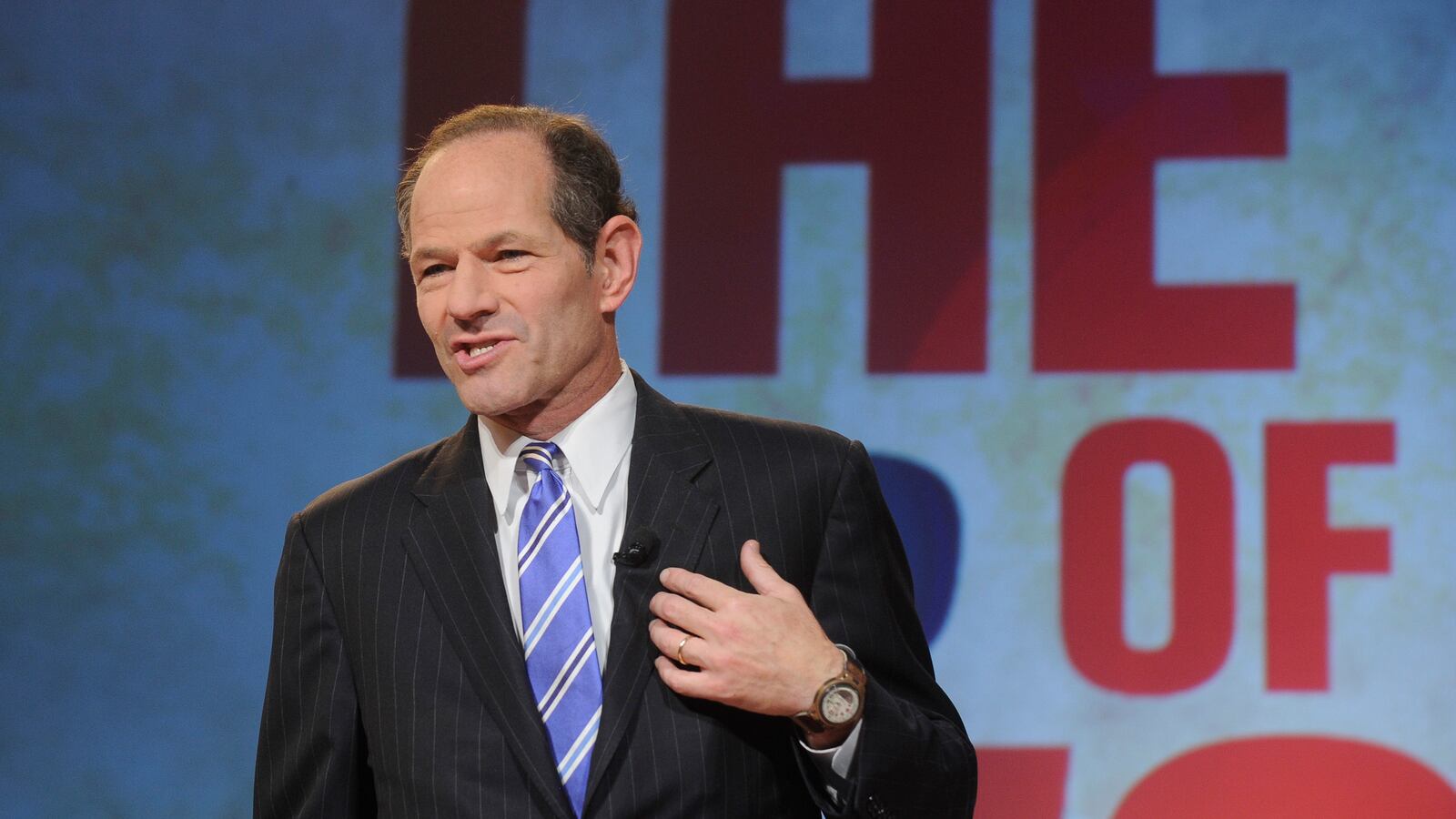It’s official—the sex scandal is dead. Eliot Spitzer is running for office.

Inspired by the unexpected success of Anthony Weiner, whose crotch shots and sexting with strangers seem only to have added to his street cred, Spitzer is echoing Weiner’s signature request for “forgiveness” and a second chance. Hubristic humility is now a thing in New York.
Perhaps it was inevitable. Spitzer had too much money and too much ambition to sit around with time on his hands and watch comparatively second-rate politicos rise to redemption. After all, few disgraced former governors who commit the unforgivable political sin—hypocrisy, not sex—find themselves offered a prime-time cable television slot within two years as compensation. And though all did not end well for Spitzer at CNN or Current TV, the man kept himself “in the arena.” But an outright run for office, even a lesser electoral perch, seemed unlikely this cycle.
It should be said that Bubba set the mold. Post-Monica, Clinton’s poll numbers climbed on credible claims of competence. He seemed liberated by dirty laundry aired in the open, finally free to be loved for who he really was: a talented, intelligent, testosterone-overproducing political machine. But he was already in his second term, without the need to face the voters again. And with time, the memory of Monica receded while the legend of Bill only looms larger.
From that foundation came the more audacious 2013 play—what if a politician tainted by sex scandal could use that notoriety to regain power and position? Mark Sanford set the template earlier this year with a successful run for his old South Carolina congressional seat. His request for a second chance was granted as high name ID, intelligence on the issues, and a deft political touch trumped any concerns about family values.
Anthony Weiner took notice and decided that now was the time to put his Q-rating and remaining campaign coffers to the test with a run for New York City mayor. Better-prepared, lesser-known Democratic challengers have failed thus far to turn Weiner’s public disgrace into a disqualifier—and buoyed by panting media coverage, he has turned the campaign into a referendum on relatability, going so far as to compare his struggle to the "hero’s arc." Overcoming the embarrassment of a sex scandal is now apparently the equivalent of serving time on Robben Island.
It must be said that Spitzer is smarter than Weiner, at least in terms of his target selection. Weiner could not help himself—he had to run for the highest office in his land, City Hall. As I’ve argued before, a far smarter if uncharacteristically modest move for Weiner would have been to run for a secondary citywide office, such as public advocate or comptroller. Pay your penance while demonstrating a commitment to public service. Work hard, keep your head down, and four to eight years later, electoral redemption would have been well earned. That is now Spitzer’s game plan.
Poor Scott Stringer. The wonky, slight, sincere Manhattan borough president thought he had the New York City comptroller’s race on a glide path. No one else of remotely similar stature seemed interested in running for an office that ostensibly oversees the city’s finances. But now he’s been big-footed by Spitzer, who will self-fund a campaign to the tune of millions of dollars. And craftily, the former governor is claiming that his revitalization of the formerly moribund New York attorney general’s office creates a template. This is smart and semi-credible. Moreover, it is likely to succeed.
And so we are likely witnessing the first act of an extended comeback by a driven man who wants to be taken seriously again and trusted with power. The fact that his brief tenure as governor was far from a success seems beside the point.
The sad fact is that in our celebrity-driven society, sex scandals guarantee that a politician will rise above the humdrum of campaigns full of earnest legislators. The press is eager to cover the soap opera, and the public seems eager to engage in the real-life telenovela. Now the clichéd old rule of Hollywood—there’s no such thing as bad press—seems to apply to public service. What could possibly go wrong?






